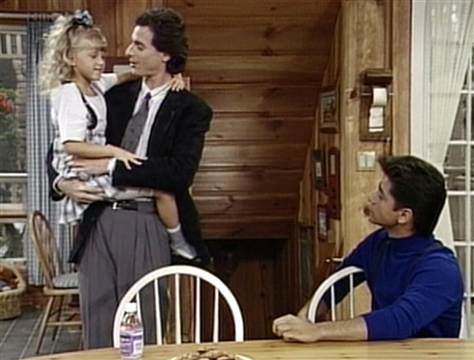What I Remember
Plot Points
Three sisters of varying ages live with their dad and his two best friends, Uncle Danny and Uncle Joey. The middle daughter, Stephanie, is "the smart one": she's the one most concerned with the rules. She wants to be like her older sister, DJ, and be left alone by her younger sister, Michelle.
Mood
As you might have imagined, since my recollection of the plot mostly centers on Stephanie, I remember feeling a certain kinship to that character. For one, in the early to mid 1990s, when I started watching the show on ABC's TGIF, I was closest in age to Michelle but I spoke and acted the most like Stephanie. My mother says I've always been the peacemaker, the mediator for the warring factions that make up my family. And Stephanie often played that role as well. Plus, her hair, with it's metal (as opposed to plastic, which was for babies) barrettes and her super cool scrunchies were the ultimate in 1990s hair accessories.

What Strikes Me Now
Plot Points
For the purposes of this discourse, I re-watched the final two episodes of the series. In these episodes, Michelle enters a horse jumping contest, falls, hits her head and loses her memory. Before the fall, however, she and Stephanie fight and Stephanie tells Michelle that she hates her. Meanwhile: DJ prepares for her senior prom after breaking up with her longtime boyfriend, Steve. And Stephanie gets the part of Juliet in a school play and gets her first kiss from her Romeo.
Mood
Though I've tried not to focus too closely on the ways in which my family was/is quite disfunctional, some of those moments have snuck into the discourses. Re-watching Full House gave me two insights, though:
- When I watched this as a child, I identified not with the character closest to my age (Michelle and I would have been almost exactly the same age) but with one slightly older. I was always a pretty serious kid, and I think my identification with an older character who often plays the role of peacemaker reflects this seriousness. Even when it comes to corny sitcoms, I wanted to be the character who seemed to have the most invested in other people.
- As I was working on this page, I was also working on my page for Where the Sidewalk Ends, and as I watched these episodes, I kept coming back to a particular poem from that collection:
As a child, I so badly wanted to be part of this family: three strong father figures and sisters near my age seemed like (and actually is) the exact opposite of my own familial situation. But the neatness of the narrative (driven, of course, by the genre and the time period in which it was produced) seem lacking now. My own childhood, marred as it was, was certainly not a bore nor was it neat and tidy. Also: no one got amnesia. So there's that.
The Land of Happy
Have you been to The Land of Happy, Where everyone's happy all day, Where they joke and they sing Of the happiest things, And everything's jolly and gay? There's no one unhappy in Happy, There's laughter and smiles galore. I have been to The Land of Happy-- What a bore!
